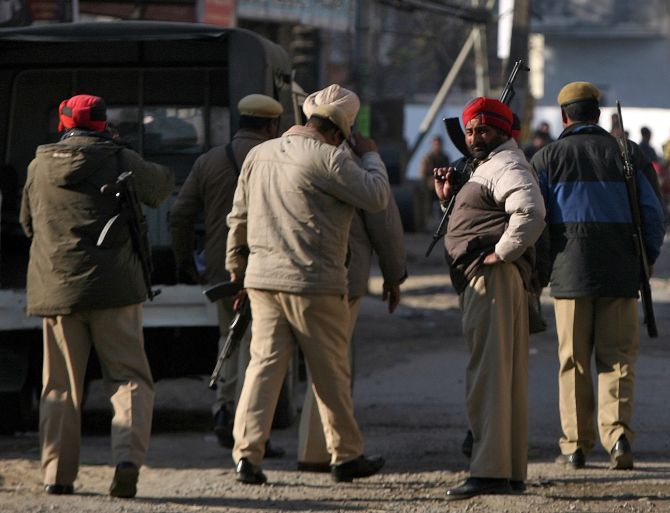'ISI-backed jihadi groups like the Jaish-e-Mohammed and Lashkar-e-Tayiba are now prepared to cross the International Border and attack targets in Punjab at will,' says Ambassador G Parthasarathy, India's former high commissioner to Pakistan.
 The terrorist attack on the Pathankot airbase brought back painful personal memories. I was serving in an army unit near the Pathankot airbase in 1965 when Pakistan Air Force F-86 Sabre Jet fighters attacked the base.
The terrorist attack on the Pathankot airbase brought back painful personal memories. I was serving in an army unit near the Pathankot airbase in 1965 when Pakistan Air Force F-86 Sabre Jet fighters attacked the base.
A substantial number of our fighter aircraft were destroyed on the ground on the first day of the 1965 conflict. The fortnight leading to that September 6, 1965 attack had seen some of my friends in the Indian Air Force, flying obsolete Vampire jet fighters, losing their lives in aerial combat.
The January 2, 2016 attack on the Pathankot airbase was masterminded by the Jaish-e-Mohammed led by Maulana Masood Azhar, a rabidly anti-Indian cleric and fundamentalist political leader. We surprisingly released Maulana Azhar from jail in Jammu during the hijacking of IC-814 to Kandahar.
It was no secret in Delhi that as the then high commissioner in Pakistan, I had serious misgivings about his release in Kandahar. Azhar returned to Pakistan to a hero's welcome. He founded the Jaish-e-Mohammed which mounted several terrorist attacks on India, most notably the December 13, 2001 attack on our Parliament, which took India and Pakistan to the brink of war.
The attack on the Pathankot airbase followed the pattern set by the terrorist attack on July 27, 2015 by the Lashkar-e-Tayiba in Gurdaspur, which is located close to Pathankot, along the Pathankot-Jammu Highway. The July 2015 attack could have led to a conflict if the five bombs planted by the terrorists on the railway line had been detonated and caused mass casualties.
What these two attacks indicate is that ISI-backed jihadi groups like the Jaish-e-Mohammed and the Lashkar-e-Tayiba are now prepared to cross the International Border and attack targets in Punjab at will -- something we have not seen in earlier years.
Like the attackers in July 2015, the Jaish terrorists, who attacked the Pathankot airbase carried sophisticated weapons, grenades, communications equipment and direction-finding Global Positioning Systems. It is fortuitous that they were spotted before they reached the Pathankot airfield and the armed forces were well prepared to thwart the attack.
The immediate aftermath of the attack followed a predictable pattern. One saw hectic activity in South Block, housing the Prime Minister's Office and the ministries of defence and external affairs.
Like always, Pakistan went into denial mode. The Pakistan Foreign Office proclaimed: 'Pakistan condemns the terrorist incident in Pathankot, India, in which many precious lives have been lost. We extend heartfelt condolences to the government and people of India and the bereaved families and wish the wounded speedy and full recovery.'
'Building on the goodwill created during the recent high level contacts between the two countries,' it added, 'Pakistan remains committed to partner with India as well as other countries in the region to completely eradicate the menace of terrorism afflicting our region.'
It also appears evident that there have been exchanges between the two governments involving the NSAs and the Foreign Offices in the wake of the Pathankot attack.
Wireless intercepts and the quality of equipment carried by the terrorists leave no doubt that they were Pakistani Punjabis with links in Bahawalpur, the hometown of Jaish supremo Maulana Masood Azhar.
The attack places the Modi government in a difficult situation. Any knee-jerk reaction, calling off talks between the foreign secretaries scheduled for mid-January, would be counterproductive internationally, especially as the prime minister's outreach to Nawaz Sharif by his visit to Lahore has been internationally acclaimed.
Retaliation and response to the attack would have to be carefully calculated and calibrated. But Pakistan cannot link this attack to its ambitions on Jammu and Kashmir as the attack has been carried out transgressing the International Border in Punjab and not across the LoC in Jammu and Kashmir.
It would be unwise to press the government to act in a hurry. New Delhi's response has to be measured and internationally justifiable. A vast range of options, covert and overt, is available to respond appropriately to the Pathankot attack.











